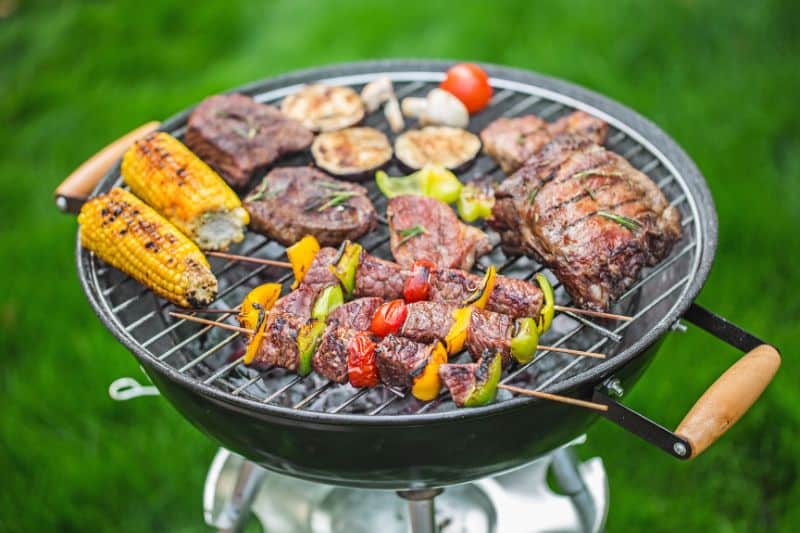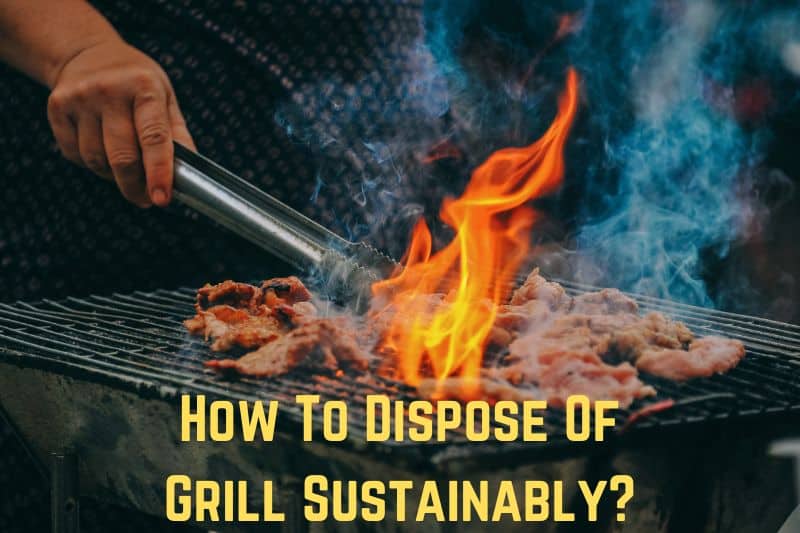How do you get rid of your grill when it is time to say goodbye? Even though barbecues may be used all year round, summertime meals almost exclusively involve them.
There comes a point when each one emits its final blazes, and even though they can last you years, you have got to let them go. However, how can you get rid of a grill? For many, the immediate thing that springs to mind is tossing it in the trash.
Regrettably, there are already many barbecue grills in landfills. However, if you try to dispose of your own more responsibly, you can prevent contributing to the issue. However, there may be a specific manner for getting rid of it, depending on your grill type.
Ways To Dispose of the Old Grill
It is crucial to understand the right way to discard a grill. If you throw your grill out among the trash or place it in a dumpster, your trash collector probably will not come and pick it up. Regardless of whether the trash service would take it up, the landfills would fill up more due to its disposal.
Try to select a disposal method that will permit the recycling of any applicable materials. Continue reading to find out how to dispose of a grill properly.
1. Junk Removal Service
You should consider contacting a rubbish removal service to find out how to get rid of an outdoor grill. Many will provide services for removing gas and electric grills.
However, learn more about what a company does with the rubbish it removes before you contract it for its services. Search for businesses that disassemble products to recycle as many of their parts as possible rather than throwing them into a landfill.
2. Donate or Sell It
If a grill is still usable, you should not be concerned about how to get rid of it. Think about selling a moderately used grill during a garage sale or via an e-commerce site rather than attempting to recycle or dispose of it.
Think about donating a used grill if no one shows interest in buying it or if you would rather avoid the headache of attempting to sell it.
Even though some donation facilities will not take grills, you can offer the grill to someone you know who has the finances to buy one for themselves. Additionally, you frequently qualify for free cleanup when the recipient picks up the grill when you sell or donate it.
3. Local Bulk Item Disposal Events
Take the old grill to a nearby bulk-item drop-off program as another option for disposal. To keep superfluous waste away from landfills, the grills, microwave ovens, outdated furnishings, and other garbage gathered on such occasions should be properly broken down and repurposed.
Contact your resident association or neighborhood community offices to determine whether, when, and how bulk collection activities will happen. Additionally, some municipalities could provide bulk pickup for nothing or a nominal cost.
You can arrange for somebody to stop by and pick up an old, rusted grill off your curb if this service is provided in your area.
4. Recycle It
Recycling reduces garbage in landfills and is an environmentally responsible method of grill disposal. Start by dismantling the grill and sorting recyclable from non-recyclable parts, such as propane tanks, plastic, and rubber.
Once finished, deliver the metallic components to the local recycling center. Ask if they take grills and follow any specific drop-off guidelines they may have.
Can You Leave Grill Out For Regular Garbage Collection?
Keeping your barbecue out for regular trash pickup is not advised since it could be hazardous to the environment. The materials used to make grills frequently are difficult to degrade and, when left to rot in a landfill, can release toxic compounds into the environment.
Instead, it is wise to inquire about appropriate disposal options with your neighborhood waste management agency. Some businesses may provide metal grill recycling solutions or may have special disposal restrictions.
First, a grill contains so many recyclable materials that recycling them makes sense. The green option would be to use scrap metal parts, which may also make you a little money. If you leave one out for routine garbage collection, many grills will fill up the dumps and add to the trash issue.

Are Grills Bad For the Environment?
When choosing which grill to purchase and utilize, there are bigger factors to consider. When using charcoal produced from non-sustainable heavy wood sources in underdeveloped countries, conventional charcoal grills are said to have the biggest carbon footprint and cause significant environmental harm.
This charcoal is made from tropical regions’ native hardwood growth. Since it takes years to grow back, it is practically lost forever once it is taken down. When wood is used to produce charcoal, it serves as a sizable sink for rapidly released carbon.
There are more environmentally friendly options available. For example, purchasing charcoal from UK forests that are properly managed helps to make your grill more environmentally friendly. This is made from trees cultivated using the coppicing method in environmentally conscious woods.
The coppiced trees expand quickly, may be harvested and used to produce charcoal using conventional techniques, and then they can be replanted to begin growing again. A single grill will not emit enough carbon emissions or other pollutants to impact the environment worldwide; however, several grills may be in use on a scorching summer Sunday.
The most problematic local environmental consequences do have certain impacts on health. People with preexisting respiratory conditions, such as asthma, may experience negative effects from the soot and particles of smoke generated by an empty grill. If an aged person has bronchitis, COPD, or any other chest condition, they are especially in danger.
Lifespan of a Grill
A charcoal or propane barbecue typically lasts five to fifteen years. Generally speaking, a propane grill has a longer lifespan, easily lasting a decade or more. A charcoal grill typically needs to be changed considerably more quickly, usually after around five years.
Of course, how frequently you use and maintain your grill will determine how long it will last. Grills left outdoors all year round or not frequently used may deteriorate more quickly than usual. Parties and delicious food are virtually a given when you own a grill, making it a pleasant experience.
Make sure to disassemble a grill into every one of its parts before throwing it away. Make sure to examine the components of your special grill to determine whether the plastic pieces are recyclable.
Even corroded metal parts can typically be recycled with a nearby scrap dealer. Electronic garbage should always be recycled with other e-waste. You may safely get rid of the grill in an eco-friendly manner in this manner. To dispose of a grill correctly, sort all components into trash, recyclables, and scrap metal.
Is It Safe To Grill in the House?
A propane grill is typically unsafe to use indoors due to the possibility of carbon monoxide buildup and lethal gas leaks from the tank that carbon monoxide sensors cannot identify.
Grills can also provide a fire threat because they produce higher temperatures than ovens and have less insulation. A gas barbecue should not be used inside. They frequently do not have the same insulation or ventilation as a gas stove, which means that they also offer a serious carbon monoxide concern in addition to producing too much heat within the house.
It will radiate an excessive amount of heat if there is no insulation! A gas grill, whether on natural or propane gas, is similar to a gas stove. There are ovens with integrated gas grills. However, those are made to use a natural gas pipe connected to your home and turned on only occasionally.
Due to the oven’s excellent insulation, most smoke and heat rises directly to the ventilation hood. Grilling indoors increases the fire risk because of its intense heat. You might have an extensive fire in minutes if you are extremely close to the wall, drapes, or anything made of paper.
Grills powered by propane release carbon monoxide. When utilized outside, the griller and others present have plenty of space for the smoke and carbon monoxide to exit safely. Without enough ventilation, dangerous carbon monoxide can quickly accumulate indoors.
It is not difficult to unearth tragic tales of carbon monoxide poisoning and inappropriate use of gas grills if you search online. The carbon monoxide released from the heat is converted into carbon dioxide when propane, wood, or charcoal is burned.
Conclusion
You notice that you have a few options for removing an old grill. Whether you recycle it, take everything to a junkyard, or donate it to a nearby charity, it is crucial to take the required precautions to ensure the material is disposed of securely and ethically.
According to these recommendations, you may get rid of your garbage in an environmentally sustainable way while also feeling good about giving it a second chance. Always remember that every tiny step we take to minimize trash and encourage sustainability can significantly impact how our planet is preserved for future generations.






